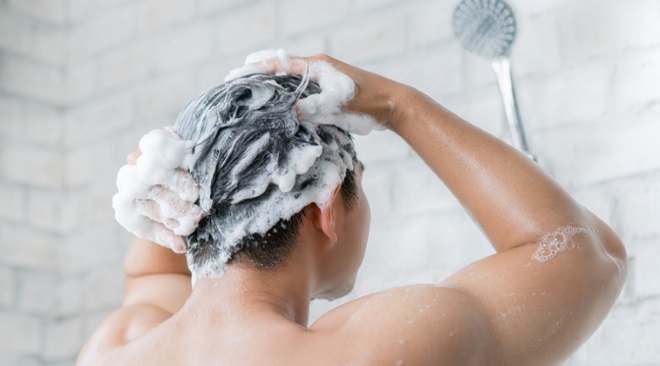
Define your hair washing routine
Wondering how often you should wash your hair is a conundrum as old as time itself. Okay, we exaggerate, as shampoo actually only became widely used from the early 1900s.
In saying that, predecessors of shampoo as we know it date back to ancient times using concoctions involving (variously) flowers, seeds, eggs, herbs and their extracts, and husks and straws of rice. In fact, even prehistoric woman (and man) will have concerned themselves with personal hair hygiene to support their communal living lifestyles.
Anyway, a history of hair washing aside, today’s blog post is about how the modern-day, gym-going, long-hours-working, image-obsessed shampoo user is (or should be) washing their hair.
In truth, the answer’s similar to ‘how long is a piece of string?’ It depends upon many factors. Before we delve into what influences your shampoo regime timings, let’s digress and look at exactly how shampoo does its job.
Sebum is an oil produced by the sebaceous glands with the purpose of lubricating hair. Sebum affects hair types differently. For example, it’s easier to travel down the follicles on fine, straight hair. Conversely, on coarser, curlier hair it’s a struggle, which means the hair’s more prone to dryness. As sebum builds up, hair becomes greasy, enabling dirt to cling to it. Shampoo is used to wash away this accumulation of oil and dirt.
The style of your hair’s important too. If your hair’s long, for instance, and requires a lengthy blow dry to style it, once a week for washing’s enough. If you use lots of styling products to achieve your look, you may prefer to wash each morning.
The final complication to add to the mix is conditioner. Unlike shampoo which cleans hair, conditioner’s role is to add weight and texture. For this reason, conditioner doesn’t have to be used every time you shampoo.
You could be forgiven for being confused. The conclusion is that how often you wash your hair is dependent upon many determinants and will range from weekly to daily, with conditioner applied less frequently.
For the brave, there’s always the no-products option. By using only water and natural substitutes (such as eggs), you’re not stripping your hair of oils, allowing your scalp to reach its sebum equilibrium. We’re not too convinced about this approach if only for the fact your hair won’t be emitting a head-turning fragrant smell. At least, not a good one anyway!
At Hairdressing Claims we’re committed to promoting good hair care and treatments. We’re also here to help if you’ve been let down and need to claim compensation from your hairdresser.
